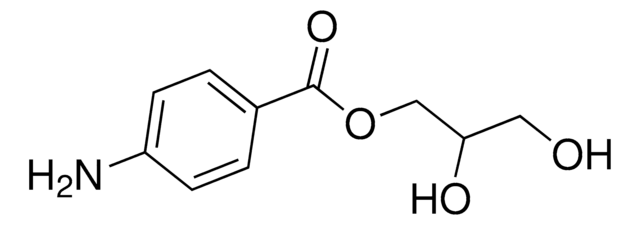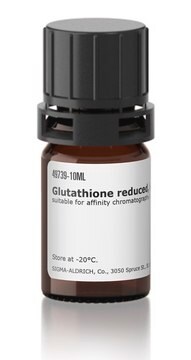PHR1359
Glutathione
Pharmaceutical Secondary Standard; Certified Reference Material
Synonym(s):
L-Glutathione reduced, γ-L-Glutamyl-L-cysteinyl-glycine, GSH
About This Item
Recommended Products
grade
certified reference material
pharmaceutical secondary standard
Quality Level
Agency
traceable to Ph. Eur. Y0000517
traceable to USP 1294820
API family
glutathione
CofA
current certificate can be downloaded
technique(s)
HPLC: suitable
gas chromatography (GC): suitable
mp
192-195 °C (dec.) (lit.)
application(s)
pharmaceutical (small molecule)
format
neat
storage temp.
2-30°C
SMILES string
N[C@@H](CCC(=O)N[C@@H](CS)C(=O)NCC(O)=O)C(O)=O
InChI
1S/C10H17N3O6S/c11-5(10(18)19)1-2-7(14)13-6(4-20)9(17)12-3-8(15)16/h5-6,20H,1-4,11H2,(H,12,17)(H,13,14)(H,15,16)(H,18,19)/t5-,6-/m0/s1
InChI key
RWSXRVCMGQZWBV-WDSKDSINSA-N
Looking for similar products? Visit Product Comparison Guide
Amino Acid Sequence
General description
Pharmaceutical secondary standards for application in quality control, provide pharma laboratories and manufacturers with a convenient and cost-effective alternative to the preparation of in-house working standards.
Application
Biochem/physiol Actions
Analysis Note
Other Notes
Footnote
Recommended products
related product
Storage Class Code
11 - Combustible Solids
WGK
WGK 2
Flash Point(F)
Not applicable
Flash Point(C)
Not applicable
Choose from one of the most recent versions:
Certificates of Analysis (COA)
Sorry, we don't have COAs for this product available online at this time.
If you need assistance, please contact Customer Support.
Already Own This Product?
Find documentation for the products that you have recently purchased in the Document Library.
Customers Also Viewed
Our team of scientists has experience in all areas of research including Life Science, Material Science, Chemical Synthesis, Chromatography, Analytical and many others.
Contact Technical Service








